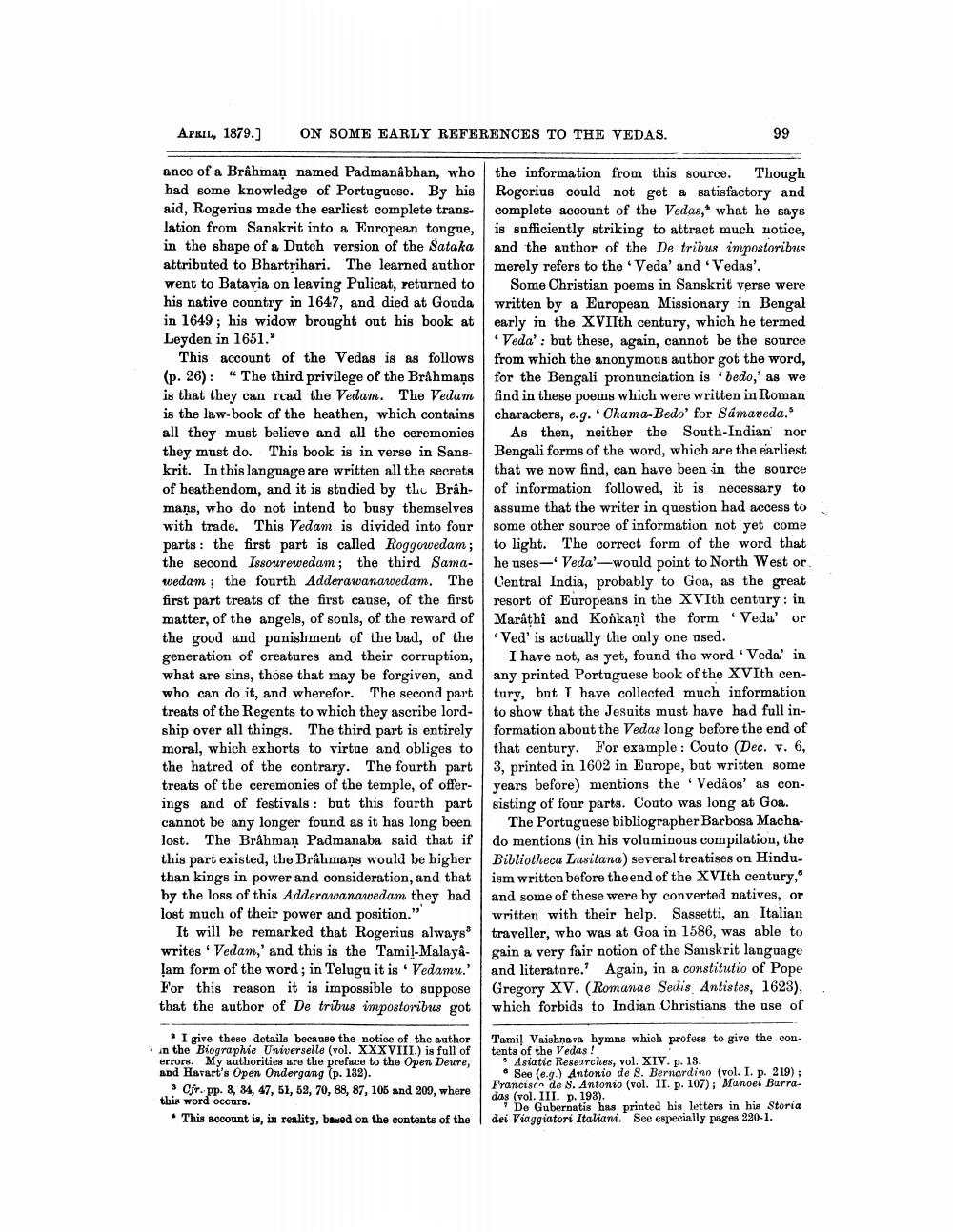________________
APRIL, 1879.)
ON SOME EARLY REFERENCES TO THE VEDAS.
99
ance of a Brahman named Padmanabhan, who the information from this source. Though had some knowledge of Portuguese. By his Rogerius could not get a satisfactory and aid, Rogerius made the earliest complete trans- complete account of the Vedas, what he says lation from Sanskrit into a European tongue, is sufficiently striking to attract much notice, in the shape of a Dutch version of the Sataka and the author of the De tribus impostoribus attributed to Bhartrihari. The learned author merely refers to the Veda' and 'Vedas'. went to Batavia on leaving Pulicat, returned to | Some Christian poems in Sanskrit verse were his native country in 1647, and died at Gouda written by a European Missionary in Bengal in 1649; his widow brought out his book at early in the XVIIth century, which he termed Leyden in 1651.'
* Veda': but these, again, cannot be the source This account of the Vedas is as follows from which the anonymous author got the word, (p. 26): "The third privilege of the Brahmans for the Bengali pronunciation is bedo,' as we is that they can read the Vedam. The Vedam find in these poems which were written in Roman is the law-book of the heathen, which contains characters, e.g. Chama-Bedo' for Sámaveda." all they must believe and all the ceremonies As then, neither the South Indian nor they must do. This book is in verse in Sans- Bengali forms of the word, which are the earliest krit. In this language are written all the secrets that we now find, can have been in the source of heathendom, and it is studied by thic Brah- of information followed, it is necessary to mans, who do not intend to busy themselves assume that the writer in question had access to with trade. This Vedam is divided into four some other source of information not yet come parts: the first part is called Roggowedam; to light. The correct form of the word that the second Issourewedam; the third Sama- he uses— Veda'—would point to North West or wedam ; the fourth Adderawanawedam. The Central India, probably to Goa, as the great first part treats of the first cause, of the first resort of Europeans in the XVIth century: in matter, of the angels, of souls, of the reward of Marathi and Konkani the form Veda' or the good and punishment of the bad, of the Ved' is actually the only one used. generation of creatures and their corruption, I have not, as yet, found the word 'Veda' in what are sins, those that may be forgiven, and any printed Portuguese book of the XVIth cenwho can do it, and wherefor. The second part | tury, but I have collected much information treats of the Regents to which they ascribe lord to show that the Jesuits must have had full inship over all things. The third part is entirely formation about the Vedas long before the end of moral, which exhorts to virtue and obliges to that century. For example: Couto (Dec. v. 6, the hatred of the contrary. The fourth part 3, printed in 1602 in Europe, but written some treats of the ceremonies of the temple, of offer- years before) mentions the Vedaos' as conings and of festivals : but this fourth part sisting of four parts. Couto was long at Goa. cannot be any longer found as it has long been The Portuguese bibliographer Barbosa Machalost. The Brâhman Padmanaba said that if do mentions (in his voluminous compilation, the this part existed, the Brâhmans would be higher Bibliotheca Lusitana) several treatises on Hinduthan kings in power and consideration, and that ism written before theend of the XVIth century, by the loss of this Adderawanawedam they had and some of these were by converted natives, or lost much of their power and position."
written with their help. Sassetti, an Italian It will be remarked that Rogerius always traveller, who was at Goa in 1586, was able to writes Vedam,' and this is the Tamil-Malaya- gain a very fair notion of the Sanskrit language ļam form of the word; in Telugu it is 'Vedamu.' and literature.' Again, in a constitutio of Pope For this reason it is impossible to suppose Gregory XV. (Romanae Sedis Antistes, 1623), that the author of De tribus impostoribus got which forbids to Indian Christians the use of
I give these details because the notice of the author in the Biographie Universelle (vol. XXXVIII.) is full of errors. My authorities are the preface to the Open Deure, and Harart's Open Ondergang (p. 132).
Cfr. pp. 8, 84, 47, 51, 52, 70, 88, 87, 105 and 209, where this word occurs.
• This account is, in reality, based on the contents of the
Tami! Vaishnava hymns which profess to give the contents of the Vedas!
Asiatic Researches, vol. XIV. p. 13. . See (e.g.) Antonio de S. Bernardino (vol. I. p. 219); Francisen de S. Antonio (vol. II. p. 107); Manoel Barradas (vol. III. p. 193).
De Gubernatis has printed his letters in his Storia dei Viaggiatori Italiani. See especially pages 220.1.




